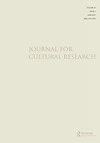A critical glance into the metacinematic gestures of The Act of Killing
IF 0.6
Q1 CULTURAL STUDIES
引用次数: 1
Abstract
ABSTRACT This paper investigates a productionist metafilm that exposes a singular organisational method: Joshua Oppenheimer’s The Act of Killing. Productionist metafilms are reflexive works which display the processual dimension of filmmaking to the extent that the frontstage of production tends to coincide with the backstage. These films empower participants and exalt their incisive role, commonly subordinated to the decision-making power wielded by film directors. Their estranging character is mainly due to the presence of metacinematic gestures: film segments which exhibit cinema as a medium. This film analysis is approached through a dissection of the notion of gesture in productionist metafilms as imbued with impersonal markers of enunciation. The Act of Killing performs gestures which trigger forms of psychoanalytical self-examination in its participants while unpacking socio-cultural and organisational issues related to the Indonesian society and the nature of the filmmaking process. Through performances of role-playing and role-reversal, the film awakes the perpetrators’ suppressed sense of guilt and the consequences of impunity. Finally, it outstrips the narratives of denial and increases self-awareness of their complex psychological and socio-cultural condition.对《杀戮演绎》中机械动作的批判一瞥
摘要本文研究了一部揭露了一种独特组织方法的生产主义元电影:约书亚·奥本海默的《杀戮行为》。制片主义元电影是反射性作品,它展示了电影制作的过程维度,以至于制作的前台往往与后台重合。这些电影赋予了参与者权力,提升了他们敏锐的角色,通常服从于电影导演的决策权。他们的表演特点主要是由于元电影手势的存在:电影片段将电影作为一种媒介来展示。这一电影分析是通过剖析生产主义元电影中的手势概念来进行的,因为手势充满了非个人的发音标记。《杀戮行为》的表演姿态引发了参与者的精神分析自我审视,同时揭示了与印尼社会和电影制作过程性质有关的社会文化和组织问题。通过角色扮演和角色反转的表演,影片唤醒了犯罪者被压抑的罪恶感和有罪不罚的后果。最后,它超越了否认的叙事,增加了对他们复杂的心理和社会文化状况的自我意识。
本文章由计算机程序翻译,如有差异,请以英文原文为准。
求助全文
约1分钟内获得全文
求助全文
来源期刊

Journal for Cultural Research
CULTURAL STUDIES-
CiteScore
1.40
自引率
0.00%
发文量
23
期刊介绍:
JouJournal for Cultural Research is an international journal, based in Lancaster University"s Institute for Cultural Research. It is interested in essays concerned with the conjuncture between culture and the many domains and practices in relation to which it is usually defined, including, for example, media, politics, technology, economics, society, art and the sacred. Culture is no longer, if it ever was, singular. It denotes a shifting multiplicity of signifying practices and value systems that provide a potentially infinite resource of academic critique, investigation and ethnographic or market research into cultural difference, cultural autonomy, cultural emancipation and the cultural aspects of power.
 求助内容:
求助内容: 应助结果提醒方式:
应助结果提醒方式:


